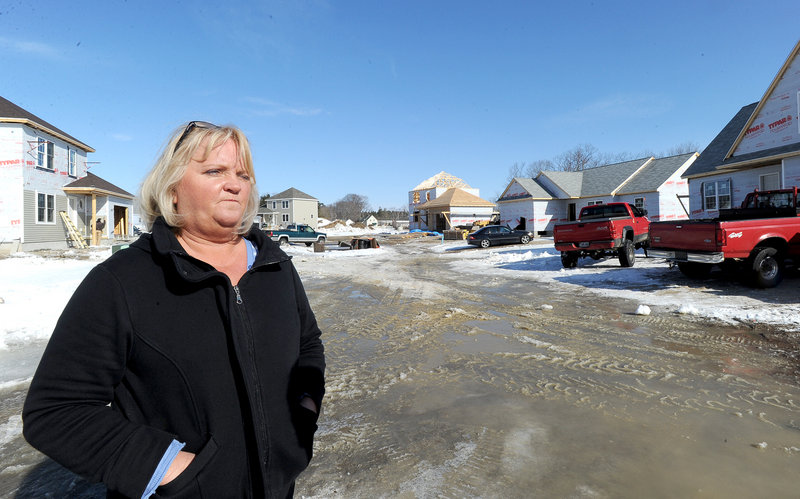GORHAM — Karen Pitts is in home ownership limbo.
Six months ago, she signed an agreement to buy a new home in Gorham, and soon after got approval for a low-income loan from the federal government.
But Pitts still hasn’t moved in — the government hasn’t cut her a check.
She and about 50 other Mainers are feeling the effects of the federal budget dispute firsthand. They have been approved for federal home loans, but have been unable to close on their deals because of cuts to the programs on which they rely. Also affected are some home sellers, who are forced to hold empty properties until the federal government pays up.
“It’s a waiting game. It’s frustrating because I know I can have this house,” said Pitts, who is eager to move with her daughter from a trailer in Buxton to the new home in the Hawkes Farm development in Gorham.
“I want to have a newer, safer place for my child,” she said.
The delayed financing involves Rural Housing Direct Loans, issued by the U.S. Department of Agriculture’s Rural Development agency. The program provides interest-rate subsidies for low-income home buyers who purchase property in rural areas. Another Rural Development program guarantees loans from private lenders to low-income borrowers.
In the fiscal year that ended Sept. 30, the Rural Development office in Maine lent a total of $55 million to 382 single-family home- owners under the Rural Housing Direct Loan program. So far in 2011, the agency has loaned $7.9 million to Mainers.
Virginia Manuel, Maine’s state director of the Rural Development program, said the decline is a result of federal spending cuts. She said temporary appropriations bills — under which the government has operated since October — have provided limited money.
As a result, Manuel said, loans for about 50 Mainers, totaling $6 million, have been approved but not paid.
“USDA Rural Development acts like a bank, and if we don’t have funding we can’t lend to single-family homeowners,” she said. “We get funding through (federal budget) extensions, but we don’t know how much. And we are competing with (all of the) other states.”
Chris LaRoche, housing director for the York County Community Action Corp., said the delay has put families in uncertain circumstances.
“A lot of people are waiting to buy their homes — waiting on pins and needles. And they can’t close until Congress (approves) a budget,” said LaRoche, whose nonprofit group counsels home buyers and originates some of the USDA’s loans.
Susan Duchaine, owner of Design Dwelling Inc. of Gorham, which is developing the Hawkes Farm community, said she has contracts with about 10 buyers but cannot close the deals.
“We have (built) nine or 10 homes and have not gotten paid for them,” she said.
Duchaine said the uncertainty forced her to delay construction on another 10 to 12 homes in her developments. She has reduced her construction staff.
The Rural Housing Direct Loan program helps Americans who earn 80 percent or less of an area’s median income. Borrowers in the program can pay a discounted interest rate, based on their income.
Manuel said the goal of the program is to “help lower-income people own a home and build wealth.”
LaRoche called the USDA’s loans “one of the best programs the government has ever put out there.”
He said the loans and loan guarantees make home ownership possible for Americans who don’t qualify for private loans.
Manuel said her agency has been transparent about the lack of federal funds, and has instructed Rural Development field offices — there are four in Maine — and partner organizations such as community action corporations to inform home buyers about the delays.
Only the Rural Housing Direct Loan program, not the loan guarantee program, is underfunded, she said.
Staff Writer Jonathan Hemmerdinger can be reached at 791-6316 or at:
jhemmerdinger@pressherald.com
Send questions/comments to the editors.


